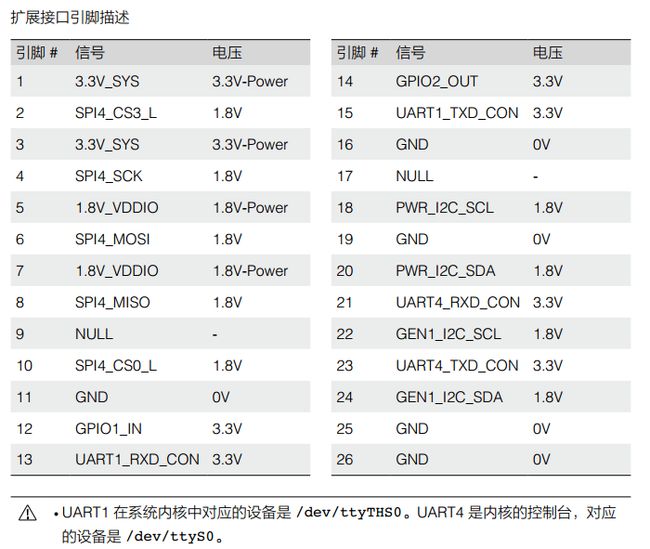Linux(妙算)串口通信
妙算上搭载的Linux,其串口操作与普通Linux相同。
通过官方文档可知,妙算共有四个串口可用,
本次实验使用串口1,其对应的设备为/dev/ttyTHS0,为盒子上的13和15号引脚。
其接线如图所示
代码
#include /*标准输入输出定义*/
#include /*标准函数库定义*/
#include /*Unix标准函数定义*/
#include /**/
#include /**/
#include /*文件控制定义*/
#include /*PPSIX终端控制定义*/
#include /*错误号定义*/
/*@brief 设置串口通信速率
*@param fd 类型 int 打开串口的文件句柄
*@param speed 类型 int 串口速度
*@return void
*/
#define FALSE 1
#define TRUE 0
char *recchr="We received:\"";
int speed_arr[] = { B921600, B460800, B230400, B115200, B57600, B38400, B19200, B9600, B4800, B2400, B1200, B300, B38400, B19200, B9600, B4800, B2400, B1200, B300, };
int name_arr[] = {921600, 460800, 230400, 115200, 57600, 38400, 19200, 9600, 4800, 2400, 1200, 300, 38400, 19200, 9600, 4800, 2400, 1200, 300, };
void set_speed(int fd, int speed)
{
int i;
int status;
struct termios Opt;
tcgetattr(fd, &Opt);
for ( i= 0; i < sizeof(speed_arr) / sizeof(int); i++)
{
if (speed == name_arr[i])
{
tcflush(fd, TCIOFLUSH);
cfsetispeed(&Opt, speed_arr[i]);
cfsetospeed(&Opt, speed_arr[i]);
status = tcsetattr(fd, TCSANOW, &Opt);
if (status != 0)
perror("tcsetattr fd1");
return;
}
tcflush(fd,TCIOFLUSH);
}
}
/*
*@brief 设置串口数据位,停止位和效验位
*@param fd 类型 int 打开的串口文件句柄*
*@param databits 类型 int 数据位 取值 为 7 或者8*
*@param stopbits 类型 int 停止位 取值为 1 或者2*
*@param parity 类型 int 效验类型 取值为N,E,O,,S
*/
int set_Parity(int fd,int databits,int stopbits,int parity)
{
struct termios options;
if ( tcgetattr( fd,&options) != 0)
{
perror("SetupSerial 1");
return(FALSE);
}
options.c_cflag &= ~CSIZE;
switch (databits) /*设置数据位数*/
{
case 7:
options.c_cflag |= CS7;
break;
case 8:
options.c_cflag |= CS8;
break;
default:
fprintf(stderr,"Unsupported data size\n");
return (FALSE);
}
switch (parity)
{
case 'n':
case 'N':
options.c_cflag &= ~PARENB; /* Clear parity enable */
options.c_iflag &= ~INPCK; /* Enable parity checking */
break;
case 'o':
case 'O':
options.c_cflag |= (PARODD | PARENB); /* 设置为奇效验*/
options.c_iflag |= INPCK; /* Disnable parity checking */
break;
case 'e':
case 'E':
options.c_cflag |= PARENB; /* Enable parity */
options.c_cflag &= ~PARODD; /* 转换为偶效验*/
options.c_iflag |= INPCK; /* Disnable parity checking */
break;
case 'S':
case 's': /*as no parity*/
options.c_cflag &= ~PARENB;
options.c_cflag &= ~CSTOPB;
break;
default:
fprintf(stderr,"Unsupported parity\n");
return (FALSE);
}
/* 设置停止位*/
switch (stopbits)
{
case 1:
options.c_cflag &= ~CSTOPB;
break;
case 2:
options.c_cflag |= CSTOPB;
break;
default:
fprintf(stderr,"Unsupported stop bits\n");
return (FALSE);
}
/* Set input parity option */
if (parity != 'n')
options.c_iflag |= INPCK;
options.c_cc[VTIME] = 150; // 15 seconds
options.c_cc[VMIN] = 0;
tcflush(fd,TCIFLUSH); /* Update the options and do it NOW */
if (tcsetattr(fd,TCSANOW,&options) != 0)
{
perror("SetupSerial 3");
return (FALSE);
}
return (TRUE);
}
/*
*@breif 打开串口
*/
int OpenDev(char *Dev)
{
int fd = open( Dev, O_RDWR | O_NONBLOCK); //| O_NOCTTY | O_NDELAY
if (-1 == fd)
{ /*设置数据位数*/
perror("Can't Open Serial Port");
return -1;
}
else
return fd;
}
/*
*@breif main()
*/
int main(int argc, char *argv[])
{
int fd;
int nread;
char buff[512];
char *dev ="/dev/ttyTHS0"; //Uart1
char recchr[512];
int temp=0;
sleep(1);
fd = OpenDev(dev); //1open uart
if (fd>0)
{
set_speed(fd,9600); //2set speed
}
else{
printf("Can't Open Serial Port!\n");
exit(0);
}
if (set_Parity(fd,8,1,'N')== FALSE) //3set parity
{
printf("Set Parity Error\n");
exit(1);
}
while(1)
{
//read
if(nread=read(fd,buff,512)>0)
{
//printf("\nLen %d\n",nread);
buff[nread]='\0';
printf("received data:%s\n",buff);
}
temp++;
sprintf(recchr,"%04d",temp);
//write
write(fd, recchr, strlen(recchr));
printf("data:%d,send ok!\n",temp);
sleep(1);
}
close(fd);
exit(0);
}